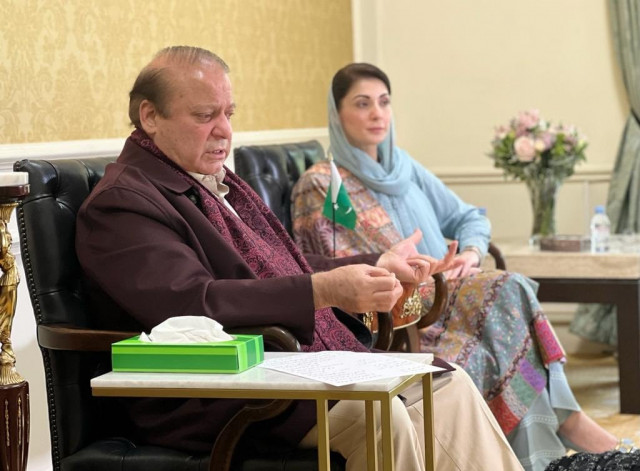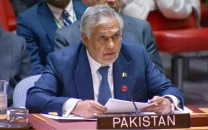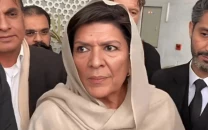PML-N decides to name Nawaz as lifetime 'Quaid’
Its legal expert says change in party’s constitution being made in line with SC 2017 verdict

The PML-N has decided to nominate its supremo, former premier Nawaz Sharif, as lifetime “Quaid” (leader) by amending the party’s constitution, a top legal mind of the party told The Express Tribune on Wednesday.
However, he added that the amendment was being introduced in view of the Supreme Court's 2017 judgment wherein Nawaz was disqualified as party president after his disqualification as a lawmaker in the Panamagate case.
This amendment would be approved by the PML-N general council members, he added.
In view of the proposed amendment, the PML-N and its president, Prime Minister Shehbaz Sharif, would be required to follow the instructions of party’s “Quaid” on certain issues.
However, the party president, would have the power under Article 63 (A) of the Constitution.
A senior lawyer said this amendment might be challenged in a court.
However, he added that the PTI might avoid approaching the court as it might require a similar amendment if its chairman Imran Khan was disqualified in the Toshakhana case.
Also read: Maryam Nawaz appointed PML-N senior vice president
In its detailed judgment in connection with the Elections Act 2017 -- which led to the disqualification of Nawaz from the presidency of his political party -- the Supreme Court had noted: “To hold that a person who is disqualified to be king can nevertheless be given a freehand to operate as a kingmaker, who may, despite lacking qualification and without going through the electoral process, act as a puppet master, pull the strings and exercise political power vicariously, would amount to making a complete mockery of the Constitution, the legislative process, the law, the government and values that we hold so dear and have consciously worked for, defended and incorporated in the Constitution.”
The verdict added that if Sections 203 and 232 of the Elections Act, 2017 were to be read independently of Articles 62 and 63, “it would open the door for political parties being run and controlled remotely and the legislature being dictated and controlled vicariously by persons who had clearly and unambiguously been barred and prohibited by the Constitution from being a part of the parliamentary, legislative and political process”.
The court observed that it had already held that sub-constitutional legislation could not be used to circumvent and bypass constitutional provisions, even more so where it was a “blatant” attempt designed to favour a few.
“Person-specific legislation is frowned at by the courts that operate in an environment of constitutionalism and rule of law,” it read.
The judgment stated that the “party head” had been defined in Article 63 (A) of the Constitution to “mean any person by whatever name called, declared as such by the party”.
The court observed that the party head typically performed various key functions.
They included but not limited to forming the central working committee, appointing a central executive body, heading the central parliamentary board, being a leader of the parliamentary party, and other pivotal functions.
“It can safely be said that the president of a political party is the material head of the entire organisation. He is at the centre of all decision-making and exercises all powers inherent in his office to ensure that the organisation works in consonance with the Constitution and [the] by-laws adopted under the Constitution,” the judgment noted.
The court observed that perusal of the provisions of Article 63 (A) of the Constitution showed that “where a member of the parliamentary party of a political party in a House resigns from membership of his party, or joins another parliamentary party, or votes or abstains from voting in the House contrary to any direction issued by the parliamentary party to which he belongs in relation to; the election of the prime minister or the chief minister, a vote of confidence or a vote of no confidence, a money bill or a constitutional amendment bill, he may be declared in writing by the party head to have defected from the political party. On making such declaration, the party head can forward a copy of the declaration to the relevant house speaker for onwards transmission to the chief election commissioner”.
On receipt of such a declaration and confirmation by the commission, the lawmaker would cease to be a member of the House.
“It is therefore clear and obvious that a declaration issued by the party head can trigger the disqualification of a member of a parliamentary party, and by withholding such a declaration, he can save a member from such consequence. The discretion and power to prosecute or exonerate lies in the hands of the party head,” it added.
Also read: TTP issues threat to PPP, PML-N in major policy shift
The court also noted that a combined reading of Article 63 (A), various provisions of the Election Act, 2017 and the constitution of the PML-N led to the “inescapable conclusion that the party head enjoys a central, pivotal and decisive role and position within the party in the electoral process, and in parliament through the parliamentary party”.
“He is the linchpin and pivot around which the entire structure of the party revolves, through which power flows to all organs, constituents and activities of the party. He has direct power, influence and control over how the party shall act and function within and outside the Parliament. One small example of his importance is that all material actions and decisions require his approval and it would not be an exaggeration to say that he, in essence, calls the shots in all important and major aspects and decisions of the party including awarding of party tickets,” the apex court observed.
The judgment went on to say it was an “absurd” suggestion that “a party head who virtually controls and holds in his hands the fate and prospects of members of his party holding public office, all of whom should fulfil the requirements of Articles 62 and 63, need not meet the requirements of the said articles himself. Such an interpretation would not only be contrary to and in conflict with the entire scheme, focus and theme of the Constitution…but would also defeat the very purpose of inserting the said provisions in the Constitution”.
The judgment mainly focuses on how morality and Islamic teachings are important for the chosen representatives of the country.
Legal experts, however, have noted that the Supreme Court is a ‘court of law and not a court of morality’.
Even, SC judge Justice Azmat Saeed Sheikh wrote in his Panama Papers verdict: “Courts of law are concerned with matters of law, not morality…There can be no manner of doubt that the term ‘honest’ as employed in Article 62 (1) (f) refers to legal honesty, an objective concept and not mere moral or ethical honesty, which is subjective. The courts have never wandered into the realm of morality in this behalf.”
Interestingly, the SC’s detailed judgment also admitted that qualifications under Article 62 (1) might be onerous and hard to meet, but at the same time, it had to be kept in mind that chosen representatives of the people, while exercising powers and authority of the state, ought to exercise the sovereignty of God by way of a sacred trust.
After Nawaz’s disqualification, the PM government had carried out legislation which permitted a convicted lawmaker to hold an office of a political party but the court in its judgment rejected that law.



















COMMENTS
Comments are moderated and generally will be posted if they are on-topic and not abusive.
For more information, please see our Comments FAQ